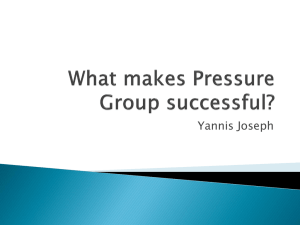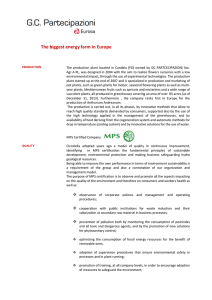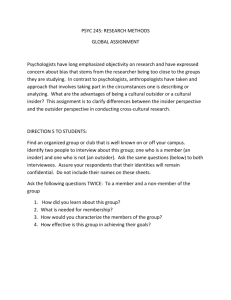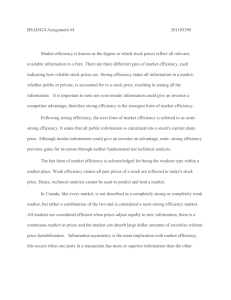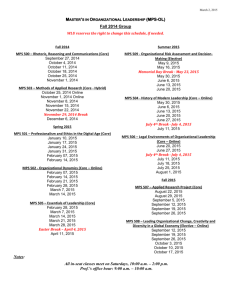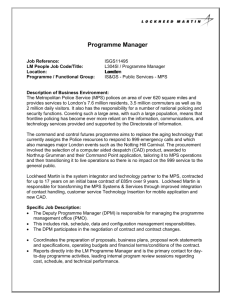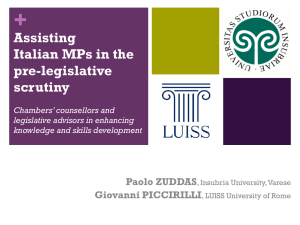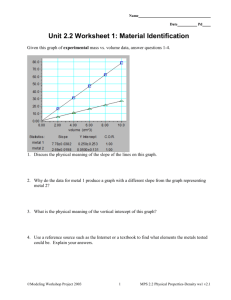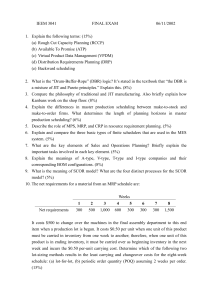Pressure Groups and The Media - St Andrews & St Brides High School
advertisement
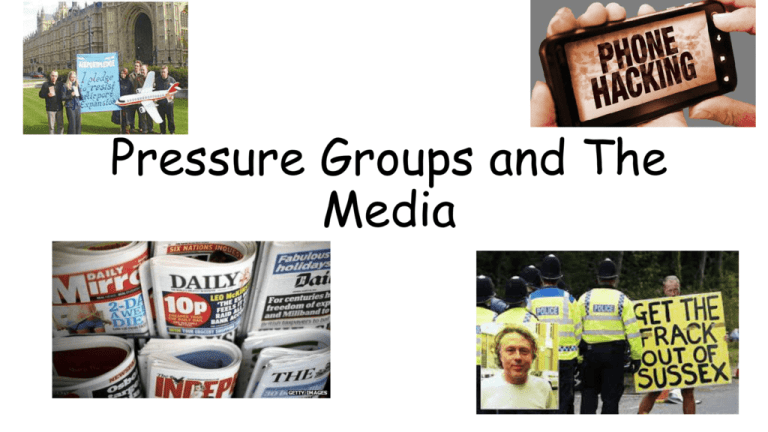
Pressure Groups and The Media Pressure Groups Areas we will focus on • Types of PGs • How Pressure groups influencing decision making • Are they good or bad for democracy? Pressure groups • A pressure group (PG) can be described as an organised group that is set up to influence governmental policy and decisions without seeking to win political power. • PGs offer the public an alternative means of putting forward their points of view in addition to voting in elections. • In Britain, the number of political parties is on the small scale compared to the mass number of pressure groups that run into their thousands. • Pressure Groups can be distinguished in a variety of different ways including; local/national/European/transnational groups and temporary/permanent groups, however the most common way is cause and sectional, insider and outsider (more on this later) The rise of Pressure Groups • Less people nowadays join political parties • More people are members of pressure Groups • A Report The POWER INQUIRY published in March, 2006 claims that people are just as interested in politics as they were in the past • BUT • They feel disengaged with conventional politics in the form of parties and elections • They believe more in direct action through Pressure groups • Pressure groups have engaged more young people • Can you think of single issues which caused young people to participate in politics and try and influence decision making? Different types of Pressure Groups • There are many different types of pressure groups. • PGs can be large international organisations such as: • Greenpeace or Friends of the Earth which campaign on environmental issues. This impacts the whole world therefore people from other countries will want to get involved. • Or very small local groups e.g. stop school closures in North Lanarkshire • They can be short term organisations which last until the campaign is over and a decision is made .i.e. gay marriage or school closures • Or they can be almost permanent organisations like Greenpeace, or CND. This is because there cause is ongoing. Pressure Group methods • Pressure groups will use different methods to try and get public support or to influence the government. They could: • Protest/demonstrate • Organisation a petition • Boycott • Use social media • Website • Poster/leaflet/letter campaigns • Get a celebrity member • Get political support – MSP/MP member • Pay a professional lobbyist • Sometimes these legal methods are not enough and some Pressure groups will break the law. This can be risky, as you risk losing public support Pressure Group examples • CND are an international pressure group who campaign against the use of nuclear weapons • The Nuclear Weapons base is in Scotland. The weapons are kept on the River Clyde at Coulport near Faslane. • Some people have dedicated their life to protesting outside the nuclear base. • CND members want the UK to get rid of nuclear weapons and leave NATO. The CND camp is the last remaining legal camp in the UK • The camp now only has 4 people remaining • It looks set to be replaced by a peace garden – this takes away from the idea of action as no protesters will be on the site. • Does this indicate that people might care about a cause but are less likely to suffer in order to promote it • CND did have high profile political members who have now been shamed i.e. Tommy Sheridan and George Galloway Success for CND • The CND peace symbol has recently been used by Lynx deodorant to launch their new brand. • The symbol was designed by a member of CND and deliberately not copy righted so it would spread as a universal symbol. • Lynx using this to market a brand goes against this ideal. • Millions of people took to Facebook and Twitter to criticise the private company for exploiting CNDs symbol • Lynx has now agreed to pay money to CND for the use of this symbol • Does this indicate that new forms of participation using technology is more successful than traditional forms of protest like the camp? Save Abronhill High Campaign • Locals in Cumbernauld fought against the council decision to close Abronhill High. • Parents and pupils held public meetings with representatives • They organised a petition • They set up Twitter and Facebook accounts • They got the stars from Gregory’s Girl to help gain them media attention (a cult film from the 80s was filmed at the school) • They protested • Yet the decision was too still close the school • This may be why some groups turn to illegal methods Clare Grogan and John Gordon Sinclair outside the school they filmed Gregory's Girl Badger Culling in the UK • It was proposed in 2011 that there should be a badger cull (organised killing) because the rate of TB in cattle was rising and many farmers blamed badgers. • The Countryside Alliance is a pressure group who represent the interest of people in rural areas across the UK. • They are a powerful organisation who have a lot of middle class members (these people tend to vote), normally Tory voters. • This group wanted the cull to go ahead and actually wanted farmers to have the right to kill badgers on their own via shooting and traps. • On the other hand groups like the RSPCA and The Badger Trust group both condemned the Badger cull. • They felt it was inhumane to kill animals in this way • They felt it would not work as injections would be more effective • They got Brian May (member of Queen – rock band from 80s – We will rock you) to front their campaign • Brian May went on numerous news programmes and chat shows to front the anti-cull movement • There was a badger video which got thousands of hits on YouTube and became a YouTube sensation. • However the UK government did decide to pilot this scheme in some areas in England • Success has not been great and the reduction in badger numbers has been less than expected • A similar idea is being put forward to cut the numbers of deer's in Scotland • Again there will be a clash of opinion from those who live and work in rural Scotland compared to animal rights activists • The Countryside Alliance have come out and publically slagged the RSPCA and told members not to give this organisation any funds!! Brian May – do you remember him now? Extreme Pressure Group – Animal Liberation Front (ALF) • The Animal Liberation Front (ALF) is an international, underground leaderless movement that engages in illegal direct action to stop cruelty to animals. • Activists will go to extreme lengths to remove animals from laboratories and farms, destroying facilities, arranging safe houses and veterinary care, and operating sanctuaries where the animals subsequently live. • Critics have compared them to terrorists because they use such violent methods at time. • In 2006 three ALF members were arrested for stealing the body of a guinea pig farmers mother. • The Hall family who own a guinea pig farm in Staffordshire were the target of a hate campaign by animal right activists. There farm was targeted by protesters who would vandalise and break into the farm. Staff were threatened • It got so bad that the family grave was dug up and the corpse of the families late mother was taken ransom. The owner was then sent a letter telling them the body would be returned to the grave when the farm was shut down. • The farm effectively stopped breeding for medical research • The activists informed the police were the body was hidden and it was returned to the grave • Three animal rights activists were charged for the crime and sent to prison • This is very extreme behaviour and lost the pressure group pupil support • Can the group consider their actions as successful? Types of Pressure Groups • Insider/Outsider Groups • Insider groups have privileged access to government Ministers and Civil Servants • They can influence policies in secret • EG the Government wish to reform the NHS in some way • The British Medical Association (BMA) are invited to comment and suggest how policy should be changed • Other groups do not have this privilege and are OUTSIDE the decision making process Insider Groups Jamie Oliver newsnight • Insider pressure groups are given this special privilege because their members often have expertise the government need for example the British Medical Association represents doctors and surgeons therefore if the government want to change something in the NHS they need this groups support • Insider group can often provide evidence in support of government policy. This helps ministers if they need to give evidence to committees • Insider groups will however be expected to act in an appropriate manner and never break the law • Insider status can change depending on which party is in government • For example the Countryside Alliance were very much outsider when the Labour government wanted to ban fox hunting. This meant they had to protest and at times use extreme methods. • Now the Tory party have regained power this group are much more likely to be listened to as many members of this group will vote Tory. The badger cull is an example of this shift in power. • Likewise the Scottish Government will be more likely to ask for advice from Business for Scotland than CBI. CBI came out and backed the Better Together Campaign before retracting their position because they are suppose to be neutral. • On the other hand CBI are still very influential and hold insider status with the UK government. Trade Unions • Trade Unions USE to be insider groups until the 1970s and Thatcherism. • A newspaper at the time of Margaret Thatcher shunning the TU made a famous quote “there will be no more sandwiches and beer at number 10” – • This showed that TU had lost their insider status and where now outsider • Trade unions use to have a close relationship with the Labour party and still sometimes pay money to the party. This relationship changed with New Labour and they do not hold the same influence. Outside Groups • These groups are outside the political process • They do not have direct contact with government Ministers • They prefer it this way as it means they can publicise their cause through the media • Examples are CND, Greenpeace, the Anti War Coalition • They can hire professional lobbyists to speak to Ministers • This is called Indirect Lobbying/action • Direct Lobbying is speaking directly to MPs who can then speak on the group’s behalf i.e. John McDonnell (MP Haynes and Harlington) helping the opposition to Heathrow’s 3rd run way. Ways of Applying Pressure • • • • • • • 1. MPs/Parliament 2. Ministers 3. Prime Minister 4. Civil Service 5. Media 6. Finance 7. Celebrities • Remember outsider pressure groups need to rely on media attention and public support and membership in order to gain influence. • This means they have to be careful about balancing getting attention with keeping the public on side. Commonwealth Games Opening Ceremony Opposition to blowing up the Red Road Flats • Glasgow City Council wanted to blow up the Red Road flats as part of the opening Ceremony • Over 4000 people signed an epetition to stop this because they felt that this was disrespectful to residents of that area • Many newspapers ran with the story and celebrities like Greg Hemphill (Still Game) signed the petition • Organisers backed down • This is an example of people power staying within the law Tripping up Trump • This group was set up after Donald Trump (American businessman) bought land to build a new golf course • This land was a site of scientific interest because of a sand dune system • Local residents were also threatened with compulsory purchase orders (CPO) for their homes. • The pressure group was set up to fight against these CPO. • This pressure group were up against Aberdeen council and the Scottish Government who seen the financial benefits of this course • This group have received funds from an anonymous person and have bought land which is at the heart of Trump’s housing and leisure development • The group have used all .sorts of methods to achieve support – made a documentary, protested and petitions • However Donald Trump has millions of pounds at his disposal while this group was made up of locals. • Money should never buy influence but this might an example of when this happened. • Since this Mr Trump has again used his money and influence to try and influence Scottish decision making. • He took the Scottish government to court to stop wind turbines being put up and spoiling the view from his hotel!! Gurkha Justice Campaign • Joanna Lumley fronted the campaign to help the Gurkha’s fight deportations from the UK • Lumley used her influence to gain lots of media attention • Lumley was invited to have tea with PM Gordon Brown to discuss the issue • Eventually the government made an announcement that all Gurkha’s who had served the British army would be allowed to settle in the UK • This shows that a strong celebrity leader can help your campaign Student Riots • In November 2010 Students took to the streets of London to protest against the Con-Lib proposed tuition fees. • Nick Clegg had promised he would never vote for tuition fees…less than a month into the coalition he had voted for tuition fees • The biggest percent of the protests were peaceful however there were some cases of extreme violence • The Tory headquarters were stormed and students refused to move when riot police came. • Some of the protesters threw large objects from the roof and fought with police officers • Prince Charles and Camellia’s car was attacked • This is an example of a cause group who lost public support because they used extreme methods Difference between Cause and Sectional Groups • Cause groups are defined by the cause that they represent • Anyone can join. The more members they have the more powerful they tend to be – why? • A person interested in animals may join an Animal Rights group such as PETA • Greenpeace if someone cares about environmental issues. • These groups can vary in size and as mentioned already they can be permanent or temporary depending on their issue Sectional Groups • People join these to bring benefits to themselves • Membership is restricted to those who share a similar background as they exist to protect members self interests. • Usually they are work related • Trade unions, employers associations and professional bodies. • Example of a sectional pressure group is the British Medical Association (BMA), who looks after the rights of those involved in the medical profession. • Examples of insider sectional groups include CBI and The Law Society • Sometimes these groups can be outsider for example think about the private sector workers who were protesting against government cuts – teachers were involved Are Pressure Groups Good or Bad for Democracy? • Good • Allow participation in democratic process • Can raise awareness between elections • Give minority groups a voice • Raise issues of importance • Make decision makers aware • For each of these you would need to illustrate with examples Are Pressure Groups Good or Bad for Democracy? Bad • Some groups more powerful than others • Money talks • Insider groups have privileged access • Secret deals are bad for democracy • No pressure group represents over 50% of public • Should not hold government to ransom • Should not break the law • Again illustrate with examples The Influence of the Media What we will be looking at • The role of the media in the political system • The influence of the media in the political system • Different examples of when the media have held the government to account Other Influences on the Political Process – The Media • The media is very significant nowadays • Some say that it is more important than the opposition in influencing the government • All the political parties are obsessed about getting national newspapers on its side • Think about The Sun moving from Labour back to the Tories in the 2010 election • The Scottish Sun backed the SNP instead of Labour in 2011 Scottish election. Media • The media is made up of newspapers, radio, magazines, TV, the Internet • All are influential, although to different extremes • The media becomes particularly important at election time • Media scrutiny is very important because it helps to make the government accountable • As the opposition (HMO) has a minority of MPs/MSPs, it can be ineffective • The media lets us know about MPs, Ministers or the government itself and whether or not they are doing anything wrong TV • Think about the impact of programmes such as Dispatches, Panorama and News Night which all effectively hold the government to account. • The success of Jamie Oliver at influencing government spending through the programme Jamie’s School Dinners. • The Dispatches programme on care of the disabled has angered the nation or the programme on Jimmy Saville • TV remember is not allowed to be biased however through these programmes they can still effectively impact and change government policy The Press • Newspapers are allowed to be bias and openly support a party. This makes them important to Parties. • The Sun has the highest circulation in UK • News International owned by Rupert Murdoch – very influential person who parties want to please • Although recent events linked to phone hacking have meant many parties want to distant themselves from the Murdoch’s • Newspaper campaigns can be successful – The Daily Record against ‘Loan sharks’. • Scottish Press backed Andrew’s law to get tighter restrictions on airguns in Scotland • The Daily Record supported the campaign against the Bedroom Tax and helped draw attention to the unfairness of this policy Phone Hacking – “hackgate” • The phone hacking scandal really came to a head in 2011 when evidence occurred that Millie Dowler’s (murder victim) families mobiles had been hacked by journalists • Before this really phone hacking had been confined to celebrities or the Royal family, which although still a clear invasion of privacy had not outraged the public to the same extent – why? • Top editors including David Cameron’s special advisor Andy Coulson and Rebecca Brooks his close friend have been arrested • Closed down News of the World. • Has brought into question the way the news will be monitored. The Leveson Inquiry • To prove the government were taking phone hacking seriously, David Cameron set up a public Inquiry into the scandal. Lord Leveson was appointed as chairperson. • The Leveson Inquiry heard evidence from numerous celebrities, police, journalists, newspaper editors and politicians • The Inquiry recommended that the press should self-regulate without government interference, however this body should be backed with legislation and a new code of conduct should be enforced • David Cameron was worried about introducing legislation which limits free press as this is undemocratic. Nick Clegg fully supported the full recommendations from the Inquiry – a split in the coalition • The inquiry has been specifically into the press, not into the media more generally. • Broadcasters are regulated by Ofcom, which is backed by law. • Other people publishing on the internet, such as bloggers and tweeters, are not regulated as such, but are covered by laws on issues such as libel and contempt of court. • Some, including MPs and peers, have questioned the wisdom of bringing more regulation to the press and not the wider internet. • Lord Justice Leveson himself referred to material on the internet as "the elephant in the room". • The Free Speech Network, which represents many editors and publishers, is vigorously opposed to any state involvement in press regulation. It says the press exists to scrutinise those in positions of power, and it could not do that if those it was scrutinising had authority over it. • But the Hacked Off campaign, which represents many alleged victims of phone-hacking, says voluntary self-regulation has failed and its said that the Leveson proposals are the way forward. Media scrutiny • The Media do play a hugely important role in ensuring those in power are held to account. • Without journalists investigating the public would often not be aware of what is going on in Parliament • The media broke the story on the expense scandal. • The biggest political scandal in recent years “The Rotten Parliament” 2005 Parliament • The Daily Telegraph unearthed one of the biggest Political scandals of all time – the MPs abuse of expenses claims. • This disgusted the public and resulted in numerous resignations, deselection and even some arrests. • The ‘John Lewis’ list was the name given to the document that MPs were allowed to claim for. • On top of these items MPs were allowed to claim for a second home if they lived outside London. • Journalists had campaigned for the expenses claims to be made public under the freedom of information, however MPs tried to pass a Bill to prevent this • This failed and the consequences of the release gives a clear indication of why MPs would have wanted to keep these claims private. MPs EXPENSES • Some MPs were employing their own family in jobs that did not exist. • MPs were claiming for second homes which were only minutes from their homes or nowhere near Westminster or the mortgage had been already paid off . • In the case of Jacqui Smith (Home Secretary) claiming full mortgage expenses yet she was living in her sisters house. • Some MPs were claiming for houses which they also rented out and gained an income from. Well done Tony. That is another Mortgage payment for a house I don’t even live in. I love being a sleazy MP Tony McNulty an MP who had to apologise to House of Commons because of misuse of expense Unbelievable claims included Hi me and my husband enjoy all sorts of movies including … • One Conservative MP claiming for the moat of his castle to be cleaned • Plasma TV’s, furniture for second homes, groceries and of course the duck house and pond! (recently just been auctioned) • Jacqui Smith also had claimed for ‘adult videos’ watched by her husband! Consequences of the Scandal • Three Labour MPs and a Conservative Peer faced criminal charges for false accounting. • These men tried to claim parliamentary privilege however the cases were heard in criminal courts resulting in jail terms • Michael Martin the Speaker of the HoC was forced to resign after he tried to prevent the scandal breaking and was more angry about the press finding out rather than the abuse of the claims. • Many MPs forced to pay back huge sums of money • Creation of the Independent Parliamentary Standards Authority Recent expenses scandal stories • In December 2012, The Daily Telegraph reported that Maria Miller (Minister for culture, sport and media) had claimed over £90,000 in parliamentary expenses for the mortgage and upkeep of a house in south London where her parents lived. • Miller had to pay back some money and make an apology to the House. • This apology last 32 seconds and caused a major media storm • Eventually Maria Miller resigned. • David Cameron was criticised for always backing Maria Miller when she showed little remorse. Liam Fox Case • The Times investigation into the affairs of Liam Fox led to him resigning from Government as Defence Secretary • His friend Adam Werrity accompanied him abroad on various occasions at taxpayers expense • Fox could not justify his actions and had to go • This shows the press doing its job • Also, if more such cases occur, it can damage the government and may affect the result of an election Challenges to Newspaper Influence • Readership of the printed press is falling. If less people buy the newspaper then they are impacting less voters • Loss of public trust due to ‘phone hacking’ • Growing importance on Social media – especially among young people • Social media leaves the printed press behind as images, videos etc. get uploaded instantly. Often printed press get their stories from here • All politicians have tried to engage with the digital era by having Twitter accounts and Facebook • David Cameron spend more on this type of media than any other PM – The site, www.webcameron.org.uk, is a key example of this Why Newspapers are still key • Most people don’t consider a story a story until it is printed • Readership is still relatively high with about 55% of people still reading at least one newspaper a day according to recent polls. This is a big portion of the electorate • Spin doctors are employed by the parties to make their leaders look good
